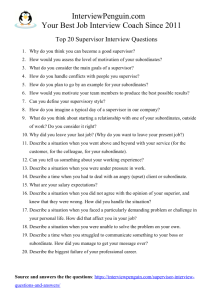Supervisor is a popular job title, and you will always compete with other people in your interview, regardless of whether you apply for a role of a production supervisor, IT supervisor, retail supervisor, or any other supervisory position. It can be five, ten, but also twenty job seekers–depending on the offer, and the company where you apply for the job, and whether they promote internally or start the process from the scratch. Now I will show you twenty-five interview questions they may ask you, including difficult behavioral questions, and a guide on how to answer first ten questions, including sample answers. If you would like to see good answers to all twenty-five questions, please refer to the eBook at the end of the article.
Table of Contents
What characterize a great supervisor?
A great supervisor can motivate their subordinates, they go by example, they have excellent observation skills, and they can utilize the strengths of the people they lead in their teams.
Alternatively you can say that great (production) supervisor maintains the highest possible productivity and motivation of the team (or of each team member), and helps the company to achieve their goals on an ongoing basis.
Sample answer:
Great supervisor is able to maintain the highest possible productivity and motivation of the people they supervise, of each team member, and they can do it for a long time. They have good cooperation with the managers, and they help the company to achieve the goals, and to progress.
How would you assess the level of motivation of your subordinates?
Choosing the right metrics (or goals), and comparing productivity of everyone on a daily basis, is a great answer. You can also say that you would talk to your people regularly, trying to get feedback, and understand whether they are satisfied with their jobs, and motivated to work hard, or the contrary is the case, for one reason or another.
Alternatively you can say that you would compare results of each employee, on a weekly and monthly basis, creating charts and trying to understand their current level of motivation with the help of your data. One way or another, you should demonstrate that you understand the importance of motivation in the workplace, and have a clear idea how to measure and evaluate it.
Sample answer:
I would choose some metrics to measure the performance of each employee in my team, and how they progress in time. This typically reflects their level of motivation, but of course we can’t forget the individuality of each employee. Someone may try very hard, but they aren’t as skillful in doing the job as their colleagues. Therefore it is important to observe the workers, how they approach the job, how many breaks they make, and so on, to have a complete picture of their motivation and value they bring to the company.
What do you consider the main goals of a supervisor?
To maintain high motivation and enthusiasm in the workplace, to ensure everyone works to their full potential, and to take care of any problems that arise in the workplace, or between the workers, such as conflict, loss of motivation, and other problems.
You can also opt for another approach, saying that the main goal of a supervisor is to achieve the goals of the company with their team, and say that everything else is secondary, and when setting your goals in general, you should always have your main goal on your mind.
Sample answer:
To maintain high motivation and enthusiasm in the workplace, to ensure everyone works to their full potential and according to the instructions, and to take care of any problems that arise in the workplace or between the workers on a shift, is the main goal. We should simply ensure that the workers try their best for the company.
Why do you think you can become a good supervisor?
Because you have the skills and abilities (mention the strengths from the first answer), because you are motivated to work hard, and because you have experience with similar jobs (if any of that is true).
Alternatively you can go for a practical answer, narrating your experience with supervising/managing a small team. It can be a working team, a sports club, or even just a group of friends you led (in any kind of circumstances). The goal is to convince us, with the help of a practical example, that you are good at supervising people, or at least have what it takes (in terms of skills, abilities, attitude to work) to become good at this job.
Sample answer:
I just feel I have what it takes to lead a group of diverse people towards a common goal. My previous experience proves that as well. As you can see on my resume, I led a small team of five people in my last job and we not only reached our goals, but actually exceeded them. Having said that, I try to stay humble and know that I still have to learn a lot to become the best possible supervisor I can be. But I have the confidence and the right attitude to become one someday.
How do you handle conflicts with people you supervise?
You should say that you try to avoid conflicts. But if there is no way to avoid a conflict, or if you fail to avoid it, you will try to understand the perspective of the other person. Eventually you will find a solution that will be good for the entire team–and not only for you.
You can also say that you always try to maintain the authority of your position, since if you lost it in a conflict with one of your subordinates, other people from the team might not respect you anymore.
You can even elaborate on your answer, saying that you try to organize small team building events for your subordinates (playing bowling, going to the football match, playing some other games, or just drinking in a bar–definitely works in many teams :)), to strengthen a team spirit, which should lead to fewer conflict situations in the workplace.
Sample answer:
Conflict happen in every workplace, and I count with experiencing them. I would try to be fair to each employee, and clearly explain the rules from the start. Employees should know what they can expect from their supervisor—in terms of rewards, but also in terms of punishment. I believe that when rules are clear from the start, it helps a lot with solving the conflicts—since we will simply follow the rules each time. Anyway, I also hope to have an opportunity to organize small team-building events for the people I supervise, such as playing bowling or going to a baseball game together, to help strengthen the team spirit.
Special Tip: What if I told you that you can practice your answers to all tricky supervisor interview questions, getting an immediate feedback from a life-like AI interview coach? And that you can start doing it for free, and it is a lot of fun too? 🙂 Check out this page on our partner website, Real Mock Interviews, pick a question, enter your email, and start practicing for free, either on your mobile phone or on your computer. Check it out now and see for yourself!
How do you plan to go by an example for your subordinates?
Sticking to the rules, working hard, and even helping with manual labor (if necessary, e.g. when someone did not arrive to work, and you did not have a replacement ready) is a good answer to this question. Another way of going by example (or another approach to this interview question) is saying that you plan to actively participate in everything the team does, including the manual labor.
Your participation will help you to understand the ins and outs of their work, as well as the strengths and weaknesses of your team members. People always respect a boss who is not afraid to take on manual labor (even if only for a few hours each week).
Sample answer:
I definitely want to be a good role model for the employees. I want to learn how to do the job myself, to be able to show them how to do it, and also to understand the ins and outs of their daily work, and typical problems that may arise. I won’t hesitate to help anytime they need a helping hand. Belonging to the team and helping them with the work is always a great way of understanding how the team functions, and what can be improved in the team.
* May also interest you: First time supervisor interview questions.
How would you motivate your team members to produce the best possible results?
Trying to create a competitive atmosphere, trying to motivate the team as a whole, organizing team building events, building good relationships with the workers, ensuring they feel good in work and receive an appropriate reward for their labor, is a great answer to this question.
Show your interviewers that you know how to work with people, and understand what motivates them to work hard every day.
Sample answer:
I would do my best to explain them the connection of their personal goals (buying something nice, supporting the family, etc) to the company goals (improving the quality of products or service, reaching higher revenues, finishing the work in the shortest possible time, etc). Once they understand that when the company is happy we will make them happy as well, they should work harder. At least that’s my presumption.
Special tip no. 2: You can also download a list of all questions in a simple, one page long PDF, and practice your interview answers anytime later:

Can you define your supervisory style?
The answer to this question depends on your style of leadership. Do you prefer liberal approach, or do you prefer to maintain a strong authority in the workplace? Either one you choose, you should be able to tell the interviews why you prefer it.
Ideally you should narrate a situation from the past, one on which you demonstrate your supervisory (leadership) style, and show the hiring managers how it helped you to achieve good results with your team. Alternatively you may say that you are ready to apply both liberal and authoritative approach, and will decide according to the conditions in the workplace, and people you will have in your team. You will simply pick the style that will suit the team you will supervise.
Sample answer:
To be honest, I try to have an individual approach and be flexible in my work. What I try to say here is that while laissez-faire supervisory style works great with some employees, in some cases you really have to keep an eye on them at all times, and tell them exactly what they should do. Hence I would define my leadership style as highly flexible, and adaptable to the circumstances in the workplace, and in the team I supervise.
How do you imagine a typical day of a supervisor in our company?
Do not say that you imagine to walk and watch other people working, all day long :).
You should try to show your attention to detail, and proactive approach to work, and also your leadership. Say that you will observe the people, trying to spot the problems, and opportunities to improve the work, and consequently the results of the team. Say us that you will always be on the site, and keep an eye on your subordinates. Of course, the exact duties depends on the place of work. As you can imagine, an IT supervisor won’t do the same things as a production supervisor…
You can also say that you will devote a portion of each day to communication with your subordinates. Asking about the working conditions, and trying to get a feedback on the work they do, and also on other team members, you always try to find the areas for improvement of both working conditions and results.
Sample answer:
I imagine I will come to work at eight, and study the plan for the day. I will briefly great each employee, and explain them the work for the day, and answer their questions. Then I will supervise their work, and join them if needed. I will obviously solve any problems, or crisis of motivation that arise in the team during the day. Some reporting and meetings with managers likely belong to the job as well. Anyway, I expect to be busy in this job, and that’s exactly what I like.
What do you think about starting a relationship with one of your subordinates, outside of work? Do you consider it right?
The right answer is yes and no. Good relationships outside of work can help to improve the atmosphere in a team, which nearly always leads to better results. On the other hand, you should not let your emotions to control your decisions at work, and that is hard to achieve if you become emotionally attached to one of your colleagues…
One way or another, we are people. You will be neither the first, nor the last boss who started to date one of their subordinates. The key is to convince us that you can make a thick line between your personal and professional life, that your relationships outside of work won’t affect the decisions you will make in your job.
Sample answer:
I think it is not right. When we love someone, it is difficult, if not impossible, to keep the same standards with them in work, standards you keep with other employees. I actually have a girlfriend right now, and have no plans to start a relationship with anyone from my new job. Having said that, things do happen. But I can assure you that I won’t look for a new girlfriend in the workplace, and will keep my relationships with colleagues on a professional level only.
More questions & sample answers to all 25 interview questions for supervisors
- Why did you leave your last job? (Why do you want to leave your present job?)
- Describe a situation when you went above and beyond with your service (for the customer, for the colleague, for your subordinate).
- Can you tell us something about your working experience?
- What characterizes a good boss (colleague) from your point of view?
- Describe a situation when you were under pressure in work.
- Describe a time when you had to deal with an angry (upset) client or subordinate.
- What are your salary expectations?
- Describe a situation when you did not agree with the opinion of your superior, and knew that they were wrong. How did you handle the situation?
- Describe a situation when you faced a particularly demanding problem or challenge in your personal life. How did that affect you in your job?
- Describe a situation when you were unable to solve the problem on your own.
- Describe a time when you struggled to communicate something to your boss or subordinate. How did you manage to get your message over?
- Describe the biggest failure of your professional career.
- ….
To know how to answer a question, and to come up with a great answer on a day of your interview, are two different things. Very different things.
If you feel anxiety and are not sure how to answer some of the questions, check my Supervisor Interview Guide. Multiple brilliant answers to all questions, and a simple guide on how to ace this interview, will make your life much easier on a big day. You will stand out with your answers, outclass the other job applicants (typically many, since supervisory jobs are popular everywhere in the world), and leave the hiring managers with one option only–to give you the job. Thank you, I wish you good luck, and see you in an interview!
Matthew
May also interest you:


